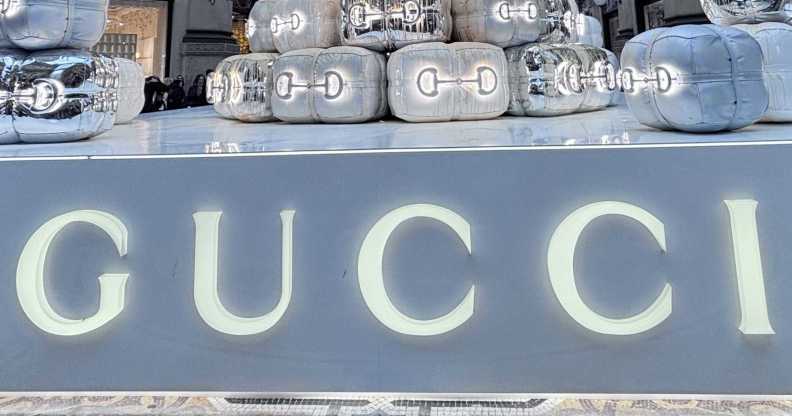
Gucci is facing homophobic backlash (Stefania D’Alessandro/Getty Images)
The latest campaign by luxury fashion house Gucci is packed full of queer desire, and, in typical bigot fashion, anti-LGBTQ+ trolls have been left foaming at the mouth.
The Christmas campaign, envisioned by creative director Sabato de Sarno, was posted to Gucci’s official Instagram account in December and “spotlights moments spent with loved ones”.
It includes a video of various holiday party scenes in full Gucci glamour, set to “I Feel Love” by Donna Summer, as well as images of models lounging on fur-clad sofas and attractive folk of varying ages, sexualities and genders having a good old snog.
“Love, love, love,” the Italian brand’s caption to an image of two men kissing reads. “Celebrating encounters full of emotion with Gucci gift.”
Two women are also seen in an intimate embrace. “Envisioning moments of joy with Gucci gift.”
Of course, the posts’ comments were flooded with hate from anti-queer bigots – many of whom took time out of their day to share that they were unfollowing Gucci’s account.
“Never buying from Gucci again,” one disgruntled (and clearly unfashionable) person wrote.
Another said: “This is making me turn my wallet back in.”
As part of the fallout from Dylan Mulvaney’s collaboration with Bud Light, brands big and small have been facing boycott threats and waves of negativity from trolls, who are outraged that businesses include queer people.
Brands such as Starbucks, Skittles, Froot Loops and Dr. Martens have come under fire, and, in May, Target was forced to remove some its Pride month merchandise or move it to the back of stores after bigots made staff feel unsafe.
During the campaign of abuse, Target’s Pride displays were attacked by right-wing extremists, who were seen vandalising items and harassing employees.
Target’s chief executive Brian Cornell defended the decision to remove the products in November, saying employees had faced “serious safety threats”, including to “light products on fire”.
In an interview with CNBC, he said: “I’ve seen natural disasters, we’ve seen the impact of the pandemic, some of the violence that took place after George Floyd’s murder. But I will tell you … what I saw in May is the first time since I’ve been in this job where I had store team members saying, ‘It’s not safe to come to work’.”
